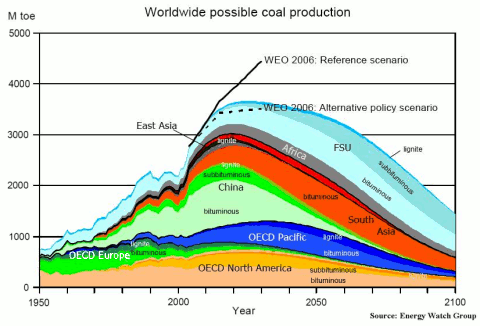...In a peer-reviewed article published in the journal Energy, they write that the world will hit "peak coal" production next year or shortly thereafter, and then mining would begin a long, steep decline.

Bottom line, say the paper's co-authors, Tadeusz Patzek, a University of Texas engineering professor, and Greg Croft, a St. Mary's College of California earth science professor, is that the 7 billion tons of coal the world is now mining and burning each year is about the best it can do.
"Our ability to produce this resource at 8 billion tons per year, in my mind, is a dream," Patzek said.
The pair's prediction is based on the "Hubbert Cycle," the resource-depletion theory that American geophysicist M. King Hubbert used in the 1950s to correctly forecast that U.S. oil production would peak two decades later.
Patzek predicts coal will peak not because supplies are running out but because the remaining deposits are increasingly difficult to mine. Alaska's North Slope, for example, has coal reserves that rival those of the continental United States, but turning that coal into energy would be practically impossible, Patzek argues.
"It would take 10 or 11 of the largest coal terminals on the Earth operating 24-7, 365 to load ships above the Arctic Circle during the polar night," he said.
"In the past, any time we demanded something, we got it. Well, this time around, it may be different," Patzek said. "The message of this paper is that we really have to be a little bit smarter and less energy-intensive."
Please read full at NY Times